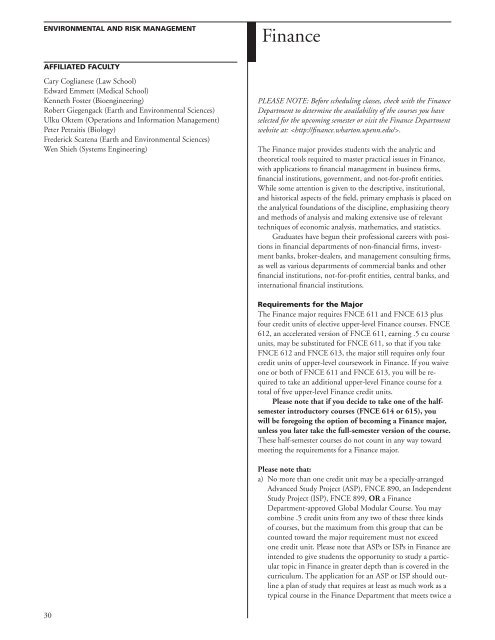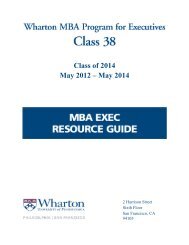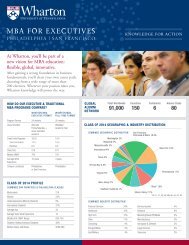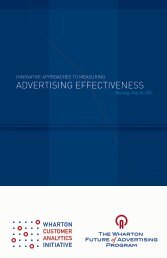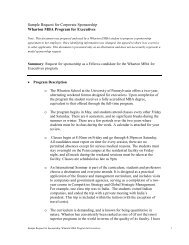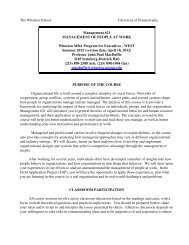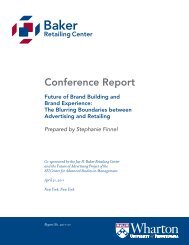Explore Options; Plan Your MBA Academic Program
Explore Options; Plan Your MBA Academic Program
Explore Options; Plan Your MBA Academic Program
You also want an ePaper? Increase the reach of your titles
YUMPU automatically turns print PDFs into web optimized ePapers that Google loves.
ENvIRONMENTAL AND RISk MANAGEMENT<br />
AFFILIATED FACULTY<br />
Cary Coglianese (Law School)<br />
Edward Emmett (Medical School)<br />
Kenneth Foster (Bioengineering)<br />
Robert Giegengack (Earth and Environmental Sciences)<br />
Ulku Oktem (Operations and Information Management)<br />
Peter Petraitis (Biology)<br />
Frederick Scatena (Earth and Environmental Sciences)<br />
Wen Shieh (Systems Engineering)<br />
30<br />
Finance<br />
Please note: Before scheduling classes, check with the Finance<br />
Department to determine the availability of the courses you have<br />
selected for the upcoming semester or visit the Finance Department<br />
website at: .<br />
The Finance major provides students with the analytic and<br />
theoretical tools required to master practical issues in Finance,<br />
with applications to financial management in business firms,<br />
financial institutions, government, and not-for-profit entities .<br />
While some attention is given to the descriptive, institutional,<br />
and historical aspects of the field, primary emphasis is placed on<br />
the analytical foundations of the discipline, emphasizing theory<br />
and methods of analysis and making extensive use of relevant<br />
techniques of economic analysis, mathematics, and statistics .<br />
Graduates have begun their professional careers with positions<br />
in financial departments of non-financial firms, investment<br />
banks, broker-dealers, and management consulting firms,<br />
as well as various departments of commercial banks and other<br />
financial institutions, not-for-profit entities, central banks, and<br />
international financial institutions .<br />
Requirements for the Major<br />
The Finance major requires FNCE 611 and FNCE 613 plus<br />
four credit units of elective upper-level Finance courses . FNCE<br />
612, an accelerated version of FNCE 611, earning .5 cu course<br />
units, may be substituted for FNCE 611, so that if you take<br />
FNCE 612 and FNCE 613, the major still requires only four<br />
credit units of upper-level coursework in Finance . If you waive<br />
one or both of FNCE 611 and FNCE 613, you will be required<br />
to take an additional upper-level Finance course for a<br />
total of five upper-level Finance credit units .<br />
Please note that if you decide to take one of the halfsemester<br />
introductory courses (FNCE 614 or 615), you<br />
will be foregoing the option of becoming a Finance major,<br />
unless you later take the full-semester version of the course.<br />
These half-semester courses do not count in any way toward<br />
meeting the requirements for a Finance major .<br />
Please note that:<br />
a) No more than one credit unit may be a specially-arranged<br />
Advanced Study Project (ASP), FNCE 890, an Independent<br />
Study Project (ISP), FNCE 899, OR a Finance<br />
Department-approved Global Modular Course . You may<br />
combine .5 credit units from any two of these three kinds<br />
of courses, but the maximum from this group that can be<br />
counted toward the major requirement must not exceed<br />
one credit unit . Please note that ASPs or ISPs in Finance are<br />
intended to give students the opportunity to study a particular<br />
topic in Finance in greater depth than is covered in the<br />
curriculum . The application for an ASP or ISP should outline<br />
a plan of study that requires at least as much work as a<br />
typical course in the Finance Department that meets twice a


